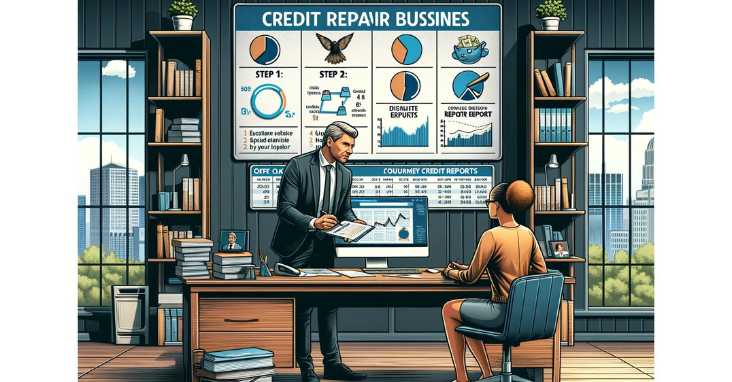How to start a credit repair business ? Identify legal requirements, secure funding, learn credit laws, and acquire software. Market your services to attract clients.
Starting a credit repair business can be a lucrative venture for those who have a passion for helping others and a strong understanding of credit repair. However, navigating the industry can be difficult without the right knowledge and resources. This article will provide a comprehensive guide on how to start a credit repair business, from understanding the industry to developing a business plan and building expertise and credibility.

Understanding the Credit Repair Industry is crucial for anyone looking at how to start a credit repair business. This includes knowing the laws and regulations surrounding credit repair, as well as understanding the credit reporting system and how to dispute inaccuracies. Developing a Business Plan is also essential for success, as it will help outline the goals, target market, and services offered by the business. Legal and Regulatory Compliance is another important aspect to consider, as credit repair businesses must comply with federal and state laws to avoid legal issues.
Key Takeaways
- Understanding the Credit Repair Industry and developing a comprehensive business plan are essential for starting a successful credit repair business.
- Legal and Regulatory Compliance is crucial to avoid legal issues.
- Building expertise and credibility, crafting effective services and pricing, and marketing and building client relationships are key to growing and sustaining the business.
High authority resource link.
Understanding the Credit Repair Industry
Understanding how to start a credit repair business requires a deep understanding of the credit repair industry. This section will provide an overview of the industry, including the Credit Repair Organizations Act, market research and trends, and the role of credit bureaus.
Credit Repair Organizations Act
The Credit Repair Organizations Act (CROA) is a federal law that regulates credit repair companies. It was enacted in 1996 to protect consumers from fraudulent credit repair practices. The law requires credit repair companies to provide consumers with a written contract that outlines the services they will provide, the fees they will charge, and the consumer’s rights under the law. Additionally, the law prohibits credit repair companies from making false or misleading claims about their services.
Market Research and Trends
Market research is an essential component of how to start a credit repair business. It helps entrepreneurs understand the current state of the credit repair market, identify opportunities for growth, and develop effective marketing strategies. According to IBISWorld, the credit repair market is expected to grow at an annual rate of 3.3% over the next five years. This growth is due to an increase in consumer debt and a growing awareness of the importance of good credit.
Role of Credit Bureaus
Credit bureaus play a critical role in the credit repair industry. They are responsible for collecting and maintaining consumer credit information, which is used to calculate credit scores. Credit repair companies work with credit bureaus to dispute inaccurate or outdated information on a consumer’s credit report. It is essential for credit repair entrepreneurs to understand the credit reporting process and establish strong relationships with the major credit bureaus.
For more information on the credit repair industry, visit the Federal Trade Commission’s website on credit repair scams.
Developing Your Business Plan

Learning how to start a credit repair business requires a solid plan to ensure financial well-being and long-term success. Developing a business plan is an essential step in building a successful credit repair business. A well-crafted plan will help you analyze startup costs, revenue models, and profitability, and set business goals and objectives.
Analyzing Startup Costs and Overhead
Before looking at how to start a credit repair business, it’s important to analyze startup costs and overhead expenses. Startup costs may include licensing and registration fees, office space, equipment, software, and marketing expenses. Overhead expenses may include rent, utilities, insurance, and employee salaries.
To estimate startup costs and overhead expenses, create a list of all the expenses you’ll incur in the first year of operation. Then, research the cost of each item on the list to determine the total startup and overhead costs. This analysis will help you determine how much money you need to look at how to start a credit repair business and how much money you need to generate to cover your expenses.
Revenue Models and Profitability
Credit repair businesses generate revenue by charging clients for credit repair services. To determine your revenue model and profitability, research the market rates for credit repair services in your area. Then, create a pricing structure that is competitive and profitable.
To calculate profitability, subtract your expenses from your revenue. If your expenses are greater than your revenue, you’ll need to adjust your pricing structure or reduce your expenses to achieve profitability.
Setting Business Goals and Objectives
Setting business goals and objectives is an essential step in building a successful credit repair business. Your goals should be specific, measurable, achievable, relevant, and time-bound.
Examples of business goals for a credit repair business may include:
- Increase revenue by 20% in the first year of operation
- Acquire 50 new clients in the first six months of operation
- Expand services to include credit counseling within the first year of operation
To achieve your business goals, create a plan of action that outlines the steps you need to take to achieve each goal. Monitor your progress regularly and adjust your plan as needed to ensure that you’re on track to achieve your business objectives.
For more information on developing a business plan, check out the U.S. Small Business Administration’s guide on Writing a Business Plan.
Legal and Regulatory Compliance

Learning how to start a credit repair business requires complying with various legal and regulatory requirements. Failure to do so can result in penalties, fines, and legal action. In this section, we will discuss the key legal and regulatory compliance issues that you need to be aware of when you look at how to start a credit repair business.
Registering Your Business Entity
The first step in looking at how to start a credit repair business is to register your business entity. This involves choosing a business structure, such as a sole proprietorship, partnership, limited liability company (LLC), or corporation, and registering it with the appropriate state agency. Each state has its own requirements for registering a business entity, so it is important to research the requirements in your state.
Obtaining Necessary Licenses and Permits
In addition to registering your business entity, you may need to obtain licenses and permits to operate a credit repair business. The requirements for licenses and permits vary by state, so it is important to research the requirements in your state. Some states require credit repair businesses to obtain a surety bond, which is a type of insurance that protects consumers from financial harm.
Understanding Federal and State Laws
Credit repair businesses are subject to both federal and state laws. The Fair Credit Reporting Act (FCRA) is a federal law that regulates the collection, dissemination, and use of consumer credit information. The Federal Trade Commission (FTC) is the primary federal agency that enforces the FCRA. In addition to federal laws, credit repair businesses must comply with state laws that regulate credit repair services.
To ensure compliance with federal and state laws, credit repair businesses should consider seeking legal advice from an attorney who specializes in credit repair law. It is also important to stay up-to-date on changes to federal and state laws that may affect your credit repair business.
For more information on legal and regulatory compliance for credit repair businesses, visit the FTC’s website.
Setting Up Your Business Infrastructure

Learning how to start a credit repair business requires careful planning and organization. In this section, we will discuss the key steps involved in setting up your business infrastructure.
Choosing a Business Structure
The first step in setting up your credit repair business is to choose a business structure. This decision will impact your tax obligations, personal liability, and the way your business is managed. There are several options to consider, including sole proprietorship, LLC, corporation, and more. It is important to research each option and consult with a legal professional to determine the best fit for your business.
Opening a Business Bank Account and Insurance
Once you have decided on a business structure, the next step is to open a business bank account and obtain insurance. A business bank account will help you keep your personal and business finances separate, which is important for tax purposes and liability protection. It is also important to obtain insurance to protect your business from potential risks and liabilities.
Credit Repair Software and Tools
Credit repair software and tools can help streamline your business operations and improve your efficiency. There are several options to consider, including Credit Repair Cloud, which offers a comprehensive platform for managing your clients, disputes, and billing. It is important to research each option and choose the one that best fits your business needs.
In conclusion, setting up your credit repair business infrastructure requires careful planning and organization. By choosing the right business structure, opening a business bank account and obtaining insurance, and utilizing credit repair software and tools, you can set your business up for success. For more information on how to start a credit repair business, check out this resource.
Crafting Your Services and Pricing

As with any business, crafting your services and pricing is an essential step in looking at how to start a credit repair business. This section will guide you through the process of defining your credit repair services and determining pricing and service fees.
Defining Your Credit Repair Services
Before setting your prices, you need to define the credit repair services you will offer. Credit repair services may include disputing errors on credit reports, negotiating with creditors to remove negative items, and providing financial education to clients. It is important to ensure that your services comply with the Credit Repair Organizations Act (CROA), which regulates credit repair services.
To ensure that your services are in compliance with CROA, it is recommended that you consult with an attorney who specializes in credit repair. Additionally, it is important to clearly define the scope of your services in your credit repair contracts.
Determining Pricing and Service Fees
When determining pricing and service fees, you have two options: charging a flat fee or charging per item. A flat fee is a one-time payment for all credit repair services, while charging per item means charging a fee for each item that is successfully removed from a client’s credit report.
It is recommended that you research the pricing of other credit repair businesses in your area to ensure that your prices are competitive. Additionally, it is important to clearly outline your pricing structure in your credit repair contracts.
It is also important to note that credit repair services are not a quick fix, and it may take several months to see results. Therefore, it is important to set realistic expectations with your clients and to provide ongoing support throughout the credit repair process.
One helpful resource for determining pricing and service fees is the National Association of Credit Services Organizations (NACSO). NACSO provides resources and guidance for credit repair businesses, including pricing and fee structures.
Overall, crafting your services and pricing is an important step in starting a successful credit repair business. By defining your credit repair services and determining fair pricing and service fees, you can provide valuable services to clients while ensuring compliance with CROA.
Marketing and Building Client Relationships
Looking at how to start a credit repair business requires more than just knowledge of the industry and credit repair techniques. To succeed, you also need to develop a marketing strategy and build strong relationships with your clients. Here are some tips to help you get started.
Developing a Marketing Strategy
Developing a marketing strategy is crucial to the success of your credit repair business. You need to identify your target market and decide on the best ways to reach them. This may include advertising, social media, email marketing, or direct mail campaigns. It is important to track your results and adjust your strategy as needed.
One effective way to market your credit repair business is to offer free credit consultations. This allows potential clients to learn more about your services and how you can help them. You can also offer a referral program to incentivize current clients to refer their friends and family.
Creating an Online Presence
In today’s digital age, having an online presence is essential for any business. This includes creating a website that is easy to navigate and provides valuable information to potential clients. Your website should include information about your services, pricing, and contact information.
It is also important to establish a presence on social media platforms such as Facebook, Twitter, and LinkedIn. This allows you to connect with potential clients and share valuable information about credit repair.
Networking and Referrals
Networking and referrals are a great way to build your credit repair business. Attend local business events and connect with other professionals in the industry. You can also join local chambers of commerce or business networking groups.
Building strong relationships with your clients is also crucial to your success. This requires trust and open communication. Always be honest and transparent with your clients, and provide regular updates on their progress.
Overall, marketing and building client relationships are essential components of looking at how to start a credit repair business. By developing a strong marketing strategy, creating an online presence, and networking with other professionals, you can attract new clients and build long-lasting relationships with your existing ones.
Managing Operations and Finances

Looking at how to start a credit repair business requires not only the ability to repair credit but also the ability to manage the operations and finances of the business. This section will discuss some key aspects of managing operations and finances.
Handling Client Communication and Records
Client communication is an essential part of any credit repair business. It is crucial to establish a clear line of communication with clients to ensure that they are informed about the progress of their credit repair and any changes to their credit score. One effective way to manage client communication is by using a client portal where clients can log in and view their progress and communicate with the credit repair business.
Keeping accurate records is also crucial for a credit repair business. It is essential to maintain records of all client communication, including emails, phone calls, and any other forms of communication. This information can be used to track progress and resolve any disputes that may arise.
Financial Management and Accounting
Proper financial management and accounting are critical for any business, including a credit repair business. It is essential to keep track of all income and expenses, including recurring revenue and any profits generated by the business. This information can be used to make informed decisions about the future of the business.
One effective way to manage finances is by using accounting software. This software can help track income and expenses, generate financial reports, and manage cash flow. It is also important to have a clear understanding of the tax implications of running a credit repair business and to consult with a tax professional to ensure compliance with all applicable tax laws.
In conclusion, managing operations and finances is a crucial part of running a successful credit repair business. By establishing clear lines of communication with clients, maintaining accurate records, and using effective financial management and accounting practices, a credit repair business can thrive and generate profits for years to come.
For more information on financial management and accounting for small businesses, check out this link.
Building Expertise and Credibility

Looking at how to start a credit repair business requires a great deal of expertise and credibility. Clients want to work with someone who is knowledgeable and trustworthy. Building a solid reputation takes time and effort, but with the right approach, it is possible to establish yourself as a credit repair specialist.
Obtaining Certification and Training
One of the best ways to build expertise and credibility is by obtaining certification and training. This not only demonstrates your knowledge of credit repair but also shows that you are committed to providing quality service to your clients. There are several organizations that offer credit repair certification, such as the National Association of Credit Services Organizations (NACSO) and the Credit Consultants Association (CCA).
Additionally, attending training courses and webinars can help you stay up-to-date with the latest trends and techniques in credit repair. Some reputable training providers include the Credit Repair Cloud Academy and the Credit Repair Expo.
Gathering Testimonials and Building Trust
Another key aspect of building credibility is gathering testimonials and building trust with your clients. Testimonials from satisfied clients can be a powerful marketing tool, as they demonstrate the effectiveness of your services. Encourage your clients to leave reviews on your website or social media pages, and consider offering incentives for referrals.
Building trust with your clients is also crucial. Be transparent and honest about your services and fees, and always follow through on your promises. Provide regular updates to your clients on the progress of their credit repair, and be available to answer any questions or concerns they may have.
In conclusion, building expertise and credibility is essential for looking at how to start a credit repair business. Obtaining certification and training, as well as gathering testimonials and building trust with your clients, can help establish you as a credit repair specialist. By focusing on providing quality service and building strong relationships with your clients, you can build a solid reputation in the industry.
Click here to learn more about the Credit Repair Cloud Academy.
Frequently Asked Questions

How to start a credit repair business from home?
How to start a credit repair business from home requires careful planning and preparation. The first step is to research the market and competition to understand the industry and identify potential clients. Next, the business owner should develop a business plan, including a marketing strategy, pricing, and services offered. The business owner should also obtain any necessary licenses and certifications and set up a business entity.
What are the legal requirements for operating a credit repair business?
Credit repair businesses are regulated by the Credit Repair Organizations Act (CROA). The CROA requires credit repair businesses to provide a written contract to clients, including a description of services, fees, and the client’s right to cancel the contract. The business owner should also comply with state and local laws and regulations, such as obtaining a business license.
How to start a credit repair business with minimal investment?
It is possible to start a credit repair business with minimal investment. The business owner can start by offering basic services, such as credit report analysis and dispute letters, and gradually expand services as the business grows. The business owner can also work from home to reduce overhead costs.
What potential income can an owner expect from a credit repair business?
The income potential for a credit repair business varies depending on the services offered, pricing, and marketing strategy. According to Credit Repair Cloud, a credit repair business can generate an average revenue of $10,000 to $20,000 per month, with some businesses earning up to $100,000 per month.
What strategies are effective for running a credit repair business online?
Running a credit repair business online requires a strong online presence and effective marketing strategies. The business owner should develop a professional website, create social media accounts, and engage with potential clients through online forums and groups. The business owner can also offer free resources, such as credit score calculators and educational articles, to attract potential clients.
How challenging is it to start and maintain a successful credit repair business?
Starting and maintaining a successful credit repair business requires hard work, dedication, and continuous learning. The business owner should stay up-to-date with industry trends and regulations and provide excellent customer service to retain clients. The business owner should also invest in marketing and advertising to attract new clients and expand the business.
For more information on how to start a credit repair business, visit the Federal Trade Commission’s website on Credit Repair.















